
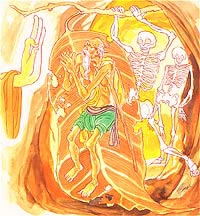
Verse 235. Man At The Door Of Death
Now a withered leaf are you
and now Death’s men draw near,
now you stand at the parting gates
but waybread you have none.
Explanation: Now you are like a withered, yellowed dried leaf. The first breath of wind will make you fall. Forces of death have come for you. You are now are death’s door. You do not have any provision for the road.
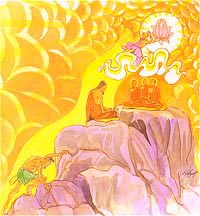
Verse 236. Get Immediate Help
Make an island of yourself,
quickly strive and wise become,
freed from stain and passionless
to go to the pure Abodes
Explanation: As things are, be a lamp, an island, a refuge unto yourself. Strive earnestly and diligently and become a wise person. Bereft of blemishes, devoid of defilements reach the heavenly realm of the noble ones.
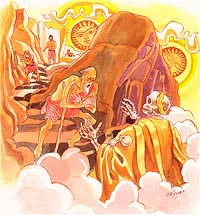
Verse 237. In The Presence Of King Of Death
Even now the end draws near,
to the presence of death you’ve fared.
Along the path’s no place for rest
and waybread you have none.
Explanation: Now, your allotted life span is spent. You have reached the presence of the king of death (Yama). You do not have a resting place in between. You do not seem to have provisions for the road either.

Verse 238. Avoid The Cycle Of Existence
Make an island of yourself,
quickly strive and wise become,
freed from stain and passionless
you’ll not return, take flesh, decay.
Explanation: Therefore, become a lamp, an island, a refuge to your own self. Strive earnestly and become a wise person. Bereft of blemishes, devoid of defilements, you will not enter the cycle of birth and decay any more.
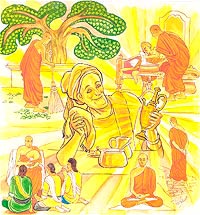
Verse 239. Purify Yourself Gradually
Little by little, time after time,
successively then let the sage
blow away all blemishes
just as a smith with silver.
Explanation: Wise persons, moment by moment, little by little, remove the blemishes off their own selves, just like the smiths removing impurities off silver.
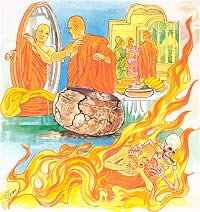
Verse 240. One’s Evil Ruins One’s Own Self
As rust arisen out of iron
itself that iron eats away,
so kammas done beyond what’s wise
lead to a state of woe.
Explanation: The rust springing from iron, consumes the iron itself. In the same way, bad actions springing out of an individual, destroys the individual himself.
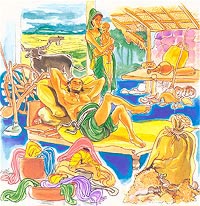
Verse 241. Causes Of Stain
For oral tradition, non-recitation,
in household life, non-exertion,
the fair of form when slovenly,
a sentry’s sloth: all blemishes.
Explanation: For formulas that have to be memorized, non repetition is the rust. For houses the neglect of the inmates is the rust. For complexion non-caring is the rust. For a guard heedlessness is the rust.
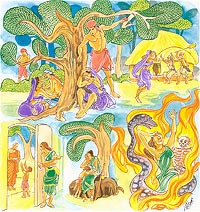
Verse 242. Ignorance Is The Greatest Taint
In mankind, conduct culpable,
with givers, avariciousness,
all blemishes these evil things
in this world or the next.
Explanation: For mankind, misconduct is the blemish. For charitable persons, miserliness is the stain. Evil actions are a blemish both here and in the here-after.
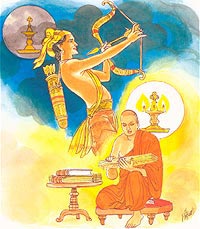
Verse 243. Ignorance The Worst Taint
More basic than these blemishes
is ignorance, the worst of all.
Abandoning this blemish then,
be free of blemish, monks!
Explanation: Monks, there is a worst blemish than all these stains. The worst stain is ignorance. Getting rid of this stain become stainless.
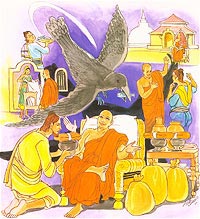
Verse 244. The Shameless Life Is Easy
Easy the life for a shameless one
who bold and forward as a crow,
is slanderer and braggart too:
this one’s completely stained.
Explanation: If an individual possesses no sense of shame, life seems easy for him since he can live whatever way he wants with no thought whatsoever for public opinion. He can do any destruction he wishes to do with the skill of a crow. Just as that of the crow, the shameless person’s life, too, is unclean. He is boastful and goes ahead utterly careless of others.
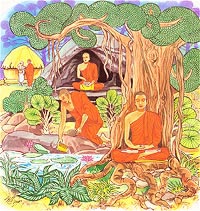
Verse 245. For A Modest Person Life Is Hard
But hard the life of a modest one
who always seeks for purity,
who’s cheerful though no braggart,
clean-living and discerning.
Explanation: The life is hard for a person who is modest, sensitive and inhibited, constantly pursuing what is pure, not attached, who is not slick and impudent, who is leading a pure life and is full of insight.
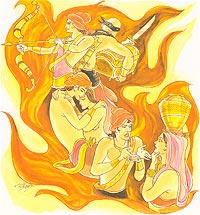
Verse 246. Wrong Deeds To Avoid
In the world who life destroys,
who words of falsity speaks,
who takes what is not freely given
or to another’s partner goes.
Explanation: One day a group of lay disciples who only kept one precept each, fell into dispute, each of them saying, “It’s a hard thing I have to do; it’s a hard precept I have to keep. Going to the Buddha to settle the dispute, the Buddha listened to what they had to say, and then, without naming a single precept as of lesser importance, said, “All precepts are hard to keep”.
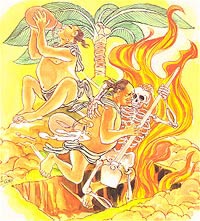
Verse 247. Precepts The Lay Person Should Follow
Or has distilled, fermented drinks:
Who with abandon follows these
extirpates the root of self
even here in this very world.
Explanation: A man who is given to taking intoxicating drinks, uproots himself in this world itself.

Verse 248. These Precepts Prevent Suffering
Therefore friend remember this;
Hard to restrain are evil acts,
don’t let greed and wickedness
down drag you long in dukkha.
Explanation: Evil actions do not have restraint or discipline. This way, you must appreciate that greed and the evil action of anger should not be allowed to inflict suffering on you for a long while.

Verse 249. The Envious Are Not At Peace
People give as they have faith,
as they are bright with joyfulness.
Who’s troubled over gifts received,
the food and drink that others get,
neither in daytime nor by night
will come to a collected mind.
Explanation: he people give in terms of the faith they have in the recipient. They give in terms of their pleasure. If one were to be jealous when they receive, food and drink, he will never attain tranquillity of mind day or night.
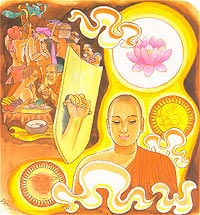
Verse 250. The Unenvious Are At Peace
But who has severed envy’s mind,
uprooted it, destroyed entire,
indeed in daytime and by night
will come to a collected mind.
Explanation: If someone were to utterly uproot and totally eradicate this jealousy, and if it is absolutely destroyed, he will, without any doubt, attain tranquillity day and night.
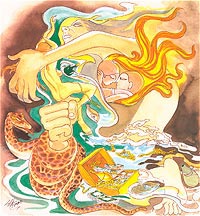
Verse 251. Craving Is The Worst Flood
There is no fire like lust,
nought seizes like aversion,
unequalled is delusion’s net,
no river’s like to craving.
Explanation: There is no fire life passion. There is no grip like hatred. There is no net like ignorance. There is no torrent like craving.
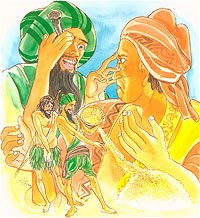
Verse 252. Easy To See Are The Faults Of Others
Other’s faults are easy to see
yet hard it is to see one’s own,
and so one winnows just like chaff
the faults of other people, while
hiding away those of one’s own
as crafty cheat the losing throw.
Explanation: The faults of others are clearly observed. But one’s own faults are difficult to see. A person winnows the fault of others into prominence, like chaff. He hides his own like the bird-hunter who conceals himself with leaves and twigs.
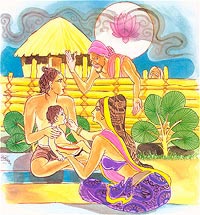
Verse 253. Seeing Others’ Faults
Who’s always seeing other’s faults,
taking offence, censorious,
pollutions spread for such a one
who’s far from their exhaustion.
Explanation: There are those who are given to the habit of observing the fault of others. They deride others constantly. Their taints keep on thriving, and far away from the state of taintlessness.
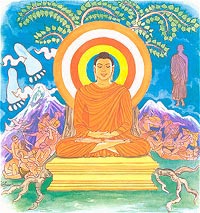
Verse 254. Nothing Is Eternal Other Than Nibbana
In skies above there is no path,
no peaceful one’s without,
in manifoldness do folk delight,
Tathagatas are manifold-free.
Explanation: In the skies, there are no footsteps that can be discerned. In the same way, outside the Buddha-Dhamma there are no persons who have realized the four Paths and the four Fruits. The ordinary masses are assailed by worldly hindrances. The Buddhas (Tathagatas) are not affected by those hindrances.

Verse 255. The Buddha Has No Anxiety
In skies above there is no path,
no peaceful one’s without,
nothing conditioned ever lasts,
no Buddha’s ever shaken.
Explanation: In the skies, there is no footsteps that can be discerned. In the same way, outside the Buddha-Dhamma there are no persons who could be described as Samana-bhikkhus. No component thing is eternal. The Buddha has no agitation or anxiety.

